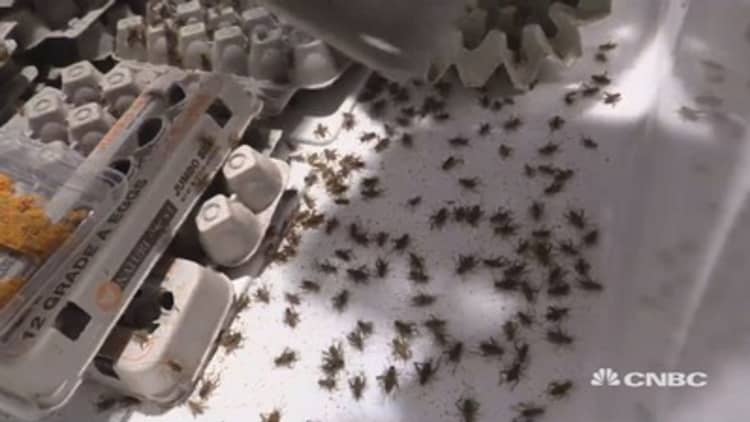Furniture retailer IKEA is well known for its affordable, build-it-yourself decor, but also for its cheap and tasty Swedish meatballs.
Customers who enjoy the signature snack while shopping for furniture may be surprised to learn that Ikea's "future-living lab," a group in Copenhagen called Space10, which researches ideas for IKEA, has released five new dishes made from sustainable ingredients such as spirulina, beetroot, hydroponic sprouts — and mealworms.
The insect items include "Neatballs," a re-imagining of the famous Swedish version, substituting mealworms for meat, and "Bug Burgers."
Grubs are good grub: "Insects generally contain more protein and are lower in fat than traditional meats and have about 20 times higher food conversion efficiency, making it a viable addition to our current menu," Simon Caspersen, a co-founder of Space10, tells CNBC Make It.
Indeed, according to a report by the United Nations' Food and Agriculture Organization, eating insects could be a solution to many of the problems that come with humans' consumption of animal protein, including demand, cost and environmental effects.
And supposedly they don't taste too bad either. Mealworms reportedly have a nutty flavor that can taste sort of like peanuts when roasted. In fact, bugs are a longtime staple in some cuisines around the world, like Mexican and Thai.
IKEA has no immediate plans to introduce the foods to stores, Caspersen says — the project is research for making sustainability taste delicious. Have they accomplished that? Take a look at their new menu.
1. The Neatball
There are two versions of the Neatball: One made of mealworms and one with carrots, parsnips and beets. In connection to IKEA's classic dish, Space10 serves them "with mashed potatoes, gravy, and lingonberry sauce," to create "a true Swedish experience," according to the company's blog post.
2. The Bug Burger
The patties are made of beetroot, parsnips, potatoes and mealworms. They're then topped with relish, ketchup (made of beetroot and blackcurrants), chive spread and lettuce grown in Space10's basement. The burger is served on a white-flour bun.
3. The Dogless Hotdog
A riff on what you might find at a baseball game, this entree substitutes glazed baby carrots for meat and is topped with beet and berry ketchup, with a cream of mustard and turmeric. Space10 also adds roasted onions, cucumbers and herbs.
The bun has a bright green color, which is from spirulina, an algae that is "an exceptionally rich source of vitamins, minerals, and protein, and one of the few nonanimal sources of vitamin B," according to Encyclopedia Britannica.
4. LOKAL Salad
To create a sustainable salad, Space10 grows lettuce and herbs in its basement with a hydroponic farm, for which no soil is needed. They created three salad blends: "red-veined sorrel, broccoli and tarragon; pea sprouts, pink-stem radish and thyme; and borage, red frill mustard and lemon balm," served with dressings made of basil, tarragon and lemon.
IKEA invested in AeroFarms, a New Jersey-based hydroponic farming start-up, last year.
5. Microgreen Ice Cream
For dessert, there's ice cream. It's made with hydroponically grown herbs like basil and mint blended with fruit juices.
Space10 is far from alone in its research — producing eco-friendly food is a challenge many wealthy business executives have set out to tackle.
Richard Branson, Bill Gates and Jack Welch have all backed Memphis Meats, a start-up that aims to grow "clean meat" in a lab. Former Cisco CEO John Chambers is an investor in cricket farm Aspire Food Group, which sells cricket flour and granola.
Mark Cuban, a judge on ABC's "Shark Tank," is an investor in crickets. He's backed Chirps Chips, which makes cricket chips, and Chapul, which makes cricket protein bars.
"Insects have been heralded for their taste by cooks and gastronomes and for their low ecological impact by environmentalists, plus for their nutritional content by public health scientists, and the UN even recommended edible insects as a resource to combat world hunger," Caspersen tells CNBC Make It.
For him, the goal is to "inspire people to be more open-minded about new ingredients" by creating dishes that are not just healthy and sustainable, but tasty too.
Adds Caspersen, "Many people still find it disgusting, and that's fine."
Don't miss: The 31-year-old CEO of $600 million RXBar once fired his own mother from the company — here's why
Like this story? Like CNBC Make It on Facebook



